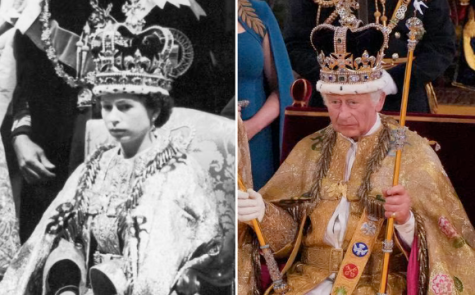The British Monarchy: Moving into the New Carolean Era

King Charles III was crowned in a lavish ceremony on Saturday, May 6th, marking a new chapter in British history. Though he legally ascended the throne in September of 2022, after his mother’s death, this religious ceremony sanctified Charles’ rule
The ceremony blended anachronism and modernism, with subtle hints of a contemporary outlook garnishing 13th-century regalia. The official website of the Royal Family published in October 2022: “The Coronation will reflect the monarch’s role today and look towards the future while being rooted in long standing traditions and pageantry.” The coronation ceremony reportedly cost up to 125 million pounds.
Seventy years after his mother’s coronation in 1953, the May 6th ceremony was enmeshed in historical significance. It consecrated the beginning of the New Carolean era and a definitive end to the Second Elizabethan Era. Analysts have widely reported that the televised coronation ceremony of 25-year-old Elizabeth overshadowed Britain’s post-World War II gloom. Queen Elizabeth II ruled for 70 years, becoming the longest-reigning monarch in British history. Monarchist or anti-monarchist, it is hard to ignore the legacy of Queen Elizabeth’s rule over critical decades in British history– the rise of the Commonwealth; the establishment of the European Union; the rise and fall of Margaret Thatcher; the fall of the Berlin Wall; the handover of Hong Kong to China marking the end of the British Empire; Princess Diana’s untimely death; and the EU Referendum, more commonly known as Brexit. Many applaud Queen Elizabeth’s ability to sustain the British monarchy amid social, political, and economic transformations.
Apart from its historical significance, King Charles’ ascension, more importantly, reflects the monarchy’s stance in British affairs. The state of the monarchy has been under scrutiny amid Charles’ ascension. A survey by the National Center for Social Research found that the British public support for the monarchy has plummeted to a historic low since data collection began 40 years ago in 1983. The study shows that only three in ten Britons think the monarchy is “very important.” Events like celebrations, births, jubilees, and marriages bring about small spurs of support; however, the reality is that most younger Britons may feel out-of-sync with the monarchy. The coronation morning saw nearly 50 arrests of anti-monarchy protesters carrying placards saying “Not My King.” However, royal experts say the likelihood of seeing the end of the British monarchy is relatively low. Though the Sovereign has a ceremonial role in British political affairs, to many Britons, it symbolizes British culture and history. Moreover, the monarchy generates substantial revenue for Britain from tourism.
A day after the coronation, Roby Mellen’s Op-Ed in The Washington Post situates the British monarchy in the larger context of 28 other monarchies: ceremonial monarchies of Europe and wealthier autocratic monarchies of Southeast Asia and the Middle East. With an increasing emphasis on slimming down European monarchies, is it less presumptuous to say that the British monarchy’s relevance remains intact?
The British monarchy is a symbol of national identity for Britons and represents the classic charm associated with royalty. At the same time, it also represents a murky colonial past rooted in racism and violence. Its legacy as an oppressive institution that aggrandized itself through “civilizing missions” in Asia and Africa must not be ignored. Does this archaic establishment hold any relevance in modern Britain? Has it slipped into obsolescence? King Charles’s coronation has reignited the debate on the relevance of monarchy.
Samya Madhukar (she/her) is a junior at Shaker High School and is serving her first year as Co-Editor-In-Chief and Writing & Editing Team Leader for...

